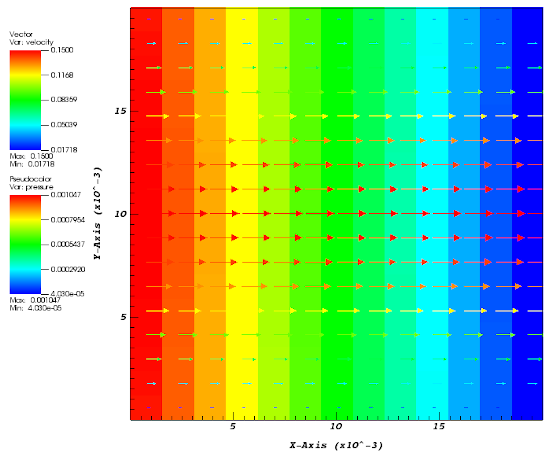Poiseuille flow test cases (2D/3D, periodic or not)
Poiseuille flow test cases (2D/3D, periodic or not)
This test case solves the 2D/3D Poiseuille flow in a rectangular channel at \( Re=100 \) (stationary flow test Reynoldsnumber"). The aims of this test case are: 1. validate the discretization of the Stokes / Navier-Stokes equations. 2. validate the boundary conditions implementations (Dirichlet, Neumann, Symmetric, Periodic) @section autotoc_md645 Configurations Domain is square, its opposite corner coordinates being \_form#1100 and \_form#1184. We solve the Navier-Stokes equations on the whole domain. The configuration is summarized in the next table. <table class="markdownTable"> <tr class="markdownTableHead"> <th class="markdownTableHeadNone"> Boundary
Condition
Value
left
Dirichlet
Parabolic profile
right
Neumann
bottom
Wall
\( U=0 \)
top
Wall
\( U=0 \)
back
Symmetric or periodic
front
Symmetric or periodic
The flow can also be forced thanks to a right-hand side on the \( u \) component of the equations corresponding to the pressure gradient of the Poiseuille flow. In that case, periodic boundary conditions are set for left/right boundaries.
The parabolic profile to impose on the left boundary is:
\[ u(y) = 6 \ u_{mean} \ y \ (H - y) \ / \ H^2 \]
where \( u_{mean} = \frac{Q}{S} \) is the mean velocity, Q is the flow rate and S the cross sectional area of the flow, and \( H \) is the height of the domain.
If periodic boundary conditions are used, the right-hand side is set to:
\[ rhs = - 12 \mu u_{mean} \ / \ H^2 \]
Here \( \frac{\partial P}{\partial x} = \frac{PB-PA}{L} \)

Navier-Stokes equation is used:
As regards spatial convergence, since a centered second order scheme is used, we expect no error on the solution compared to the quadratic exact solution. This point is achieved only if a quadratic scheme is used to apply the boundary conditions (compared to a linear one).
The advection term could be disabled since it is equal to zero. Nevertheless, its activation allows to check its validity.
To check the symmetry of the code, inlet can be imposed on bottom or back boundaries, or right-hand side associated to \( v \), or \( w \) component of the equations. Same solution should be observed up to computer precision. This done and checked in the validation script of Notus. Spatial convergence is done on the Poiseuille flow in the \( x \) direction.
With quadratic scheme for the boundary conditions, the solution is reached up to computer precision whatever the mesh size.
A convergence study is done if a linear scheme is used for the boundary conditions. The grid size starts from 10 in every direction to 80. Second order convergence is observed with \(L_2\), \(L_1\) or \(L_\infty\) norms and regular meshes. With periodic boundary condition, pressure is verified to be equal to \(0\) up to the computer precision as well as the components of the velocity \(v\) and \(w\).
2D results
| mesh | \(L_\infty\) error | Order | \(L_1\) error | Order | \(L_2\) error | Order |
|---|---|---|---|---|---|---|
| 10 | 8.237305e-04 | n/a | 1.416371e-07 | n/a | 6.732269e-06 | n/a |
| 20 | 2.883607e-04 | 1.51 | 3.710521e-08 | 1.93 | 1.990772e-06 | 1.76 |
| 40 | 8.281221e-05 | 1.80 | 9.010489e-09 | 2.04 | 5.168843e-07 | 1.95 |
| 80 | 2.206646e-05 | 1.91 | 2.201902e-09 | 2.03 | 1.303419e-07 | 1.99 |
| 160 | 5.687892e-06 | 1.96 | 5.428183e-10 | 2.02 | 3.263212e-08 | 2.00 |
2D results with periodicity
| mesh | \(L_\infty\) error | Order | \(L_1\) error | Order | \(L_2\) error | Order |
|---|---|---|---|---|---|---|
| 10 | 1.500000e-03 | n/a | 7.799999e-07 | n/a | 3.000000e-05 | n/a |
| 20 | 3.750000e-04 | 2.00 | 1.724999e-07 | 2.18 | 7.499997e-06 | 2.00 |
| 40 | 9.374999e-05 | 2.00 | 4.031243e-08 | 2.10 | 1.874997e-06 | 2.00 |
| 80 | 2.343749e-05 | 2.00 | 9.726460e-09 | 2.05 | 4.687451e-07 | 2.00 |
3D results with periodicity
| Mesh | Order | Order | Order | |||
|---|---|---|---|---|---|---|
| 16 | 5.859121e-04 | n/a | 5.564836e-09 | n/a | 1.656814e-06 | n/a |
| 32 | 1.464720e-04 | +2.000059 | 1.280326e-09 | +2.119827 | 4.138639e-07 | +2.001183 |
| 64 | 3.660720e-05 | +2.000425 | 3.036769e-10 | +2.075903 | 1.025591e-07 | +2.012701 |
References [1] http://www.legi.grenoble-inp.fr/people/Philippe.Marty/cours-mecaflu-M1.pdf P.30 for analytic result